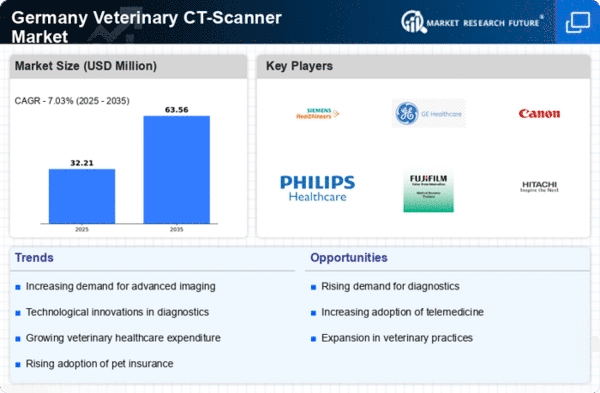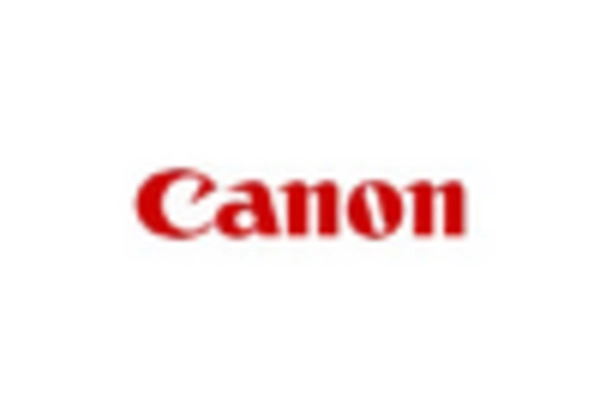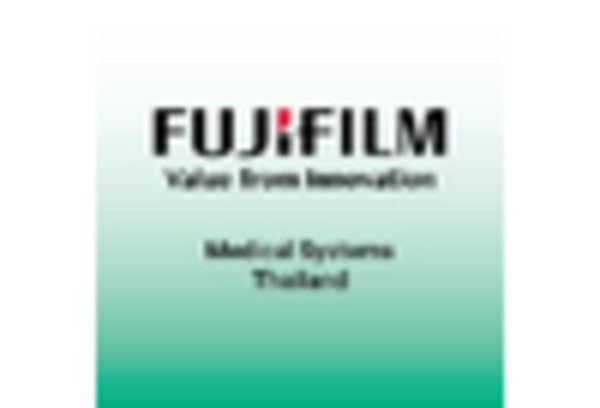Rising Pet Ownership
The Veterinary CT-Scanner Market is experiencing growth due to the increasing number of pet owners. As more households adopt pets, the demand for advanced veterinary care rises. This trend is particularly evident in urban areas, where pet ownership rates have surged. According to recent statistics, approximately 50% of households in Germany own at least one pet, leading to a heightened need for diagnostic imaging services. Veterinary practices are increasingly investing in ct-scanners to provide accurate diagnoses and improve treatment outcomes. This shift towards advanced imaging technology is likely to continue, as pet owners seek high-quality care for their animals, thereby driving the veterinary ct-scanner market.
Expansion of Veterinary Services
The expansion of veterinary services in Germany is a significant driver for the veterinary ct-scanner market. As veterinary practices diversify their offerings to include specialized services, the demand for advanced diagnostic tools, such as ct-scanners, is on the rise. Many clinics are now providing services that cater to specific animal needs, including oncology and orthopedics, which require precise imaging for effective treatment planning. This trend is reflected in the increasing number of veterinary specialists and referral practices across the country. Consequently, the veterinary ct-scanner market is likely to benefit from this expansion, as clinics invest in advanced imaging technologies to enhance their service capabilities and improve patient outcomes.
Increased Awareness of Animal Health
There is a growing awareness of animal health among pet owners in Germany, which is positively impacting the veterinary ct-scanner market. As pet owners become more informed about the importance of preventive care and early diagnosis, they are more likely to seek advanced imaging services. This shift in consumer behavior is prompting veterinary clinics to invest in ct-scanners to meet the rising demand for comprehensive diagnostic services. Additionally, educational campaigns and outreach programs by veterinary associations are further enhancing public knowledge about the benefits of advanced imaging technologies. This increased awareness is expected to drive growth in the veterinary ct-scanner market as more pet owners prioritize their animals' health.
Regulatory Support for Veterinary Practices
The Veterinary CT-Scanner Market benefits from supportive regulatory frameworks that encourage the adoption of advanced diagnostic technologies. The government has implemented policies aimed at enhancing animal health and welfare, which includes promoting the use of sophisticated imaging techniques. This regulatory environment fosters innovation and investment in veterinary practices, enabling them to acquire state-of-the-art ct-scanners. Furthermore, funding programs and grants are available for veterinary clinics looking to upgrade their equipment. As a result, the veterinary ct-scanner market is likely to see increased penetration of advanced imaging systems, driven by both regulatory support and the need for improved diagnostic capabilities.
Technological Integration in Veterinary Clinics
The integration of technology in veterinary clinics is a key driver for the Veterinary CT-Scanner Market. Clinics are increasingly adopting digital solutions that enhance operational efficiency and improve patient care. The use of electronic health records, telemedicine, and advanced imaging technologies, such as ct-scanners, is becoming commonplace. This trend is supported by the growing demand for quick and accurate diagnoses, which ct-scanners facilitate. As veterinary practices modernize their operations, the need for high-quality imaging equipment is expected to rise. Consequently, this technological integration is likely to propel the veterinary ct-scanner market forward, as clinics seek to remain competitive and provide superior care.
















